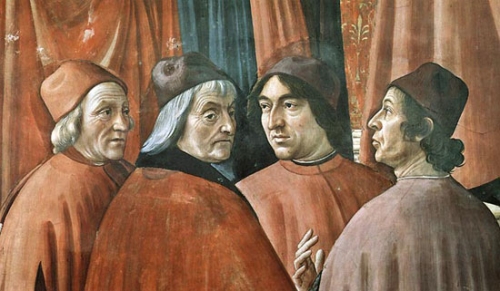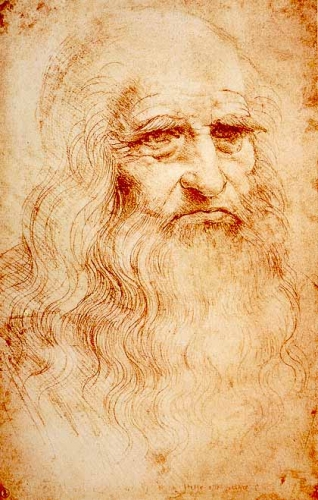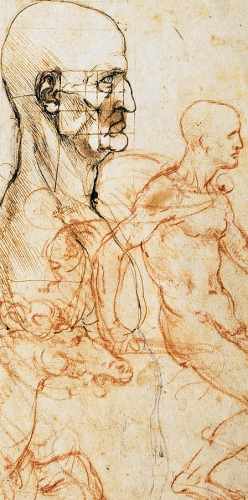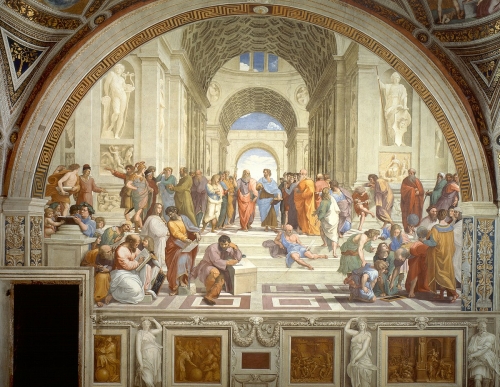I want to start with a little story. Many years ago, I saw a fresco by Raphael. “The School of Athens” is one of the pearls of Renaissance art. On it, the artist depicted immortal images of great thinkers: Heraclitus, Empedocles, Parmenides, Pythagoras, Aristotle, Plato, Socrates…and there was among them the only one woman who has always been for me a kind of model, an archetype of female wisdom — Hypatia of Alexandria. Raphael gave her the features of his beloved Margherita Luti. I looked at this collection of great minds of mankind and even then I understood that I knew the one secret. Lorenzo de’ Medici also knew it.

In the XV century, he established the Platonic Academy in Florence, headed by Marsilio Ficino. This Academy brought together outstanding philosophers, artists, architects, sculptors, and poets of the Renaissance. This was the time of the total triumph of a new type of man — homo universalis, a prominent representative of which was Leonardo da Vinci-painter, architect, sculptor, inventor, writer, musician and scientist. The very embodiment of the Union of music and mathematics, science and art. Why did this type of personality disappear today-in an era of deep specialization, and the place of the universal thinker who saw the whole picture of the world was taken by the one who looks at the world through the keyhole of his profession? These are the questions I started asking.
The XXI century presents us with global challenges. We are watching the rapid development of new technologies. But it seems that neither politicians, nor businessmen, nor inventors know the opportunities and risks associated with the development of Artificial Intelligence and biotechnologies. The problems we will soon have to deal with are beyond our comprehension. Fundamental climate changes and the risk of environmental disaster, the growth of the world’s population and migration processes, unknown epidemics and pandemics, unemployment-these are just some of the problems that can radically change our lives. These are the main questions that we have to answer.
But to solve these problems, you need a different type of thinking. As Albert Einstein said, “We can not solve our problems with the same level of thinking that created them.” To understand these problems, we need a global perspective. But where does the global perspective come from if narrow specialization is imposed everywhere? However, it is not enough today. I told you I knew a secret. It’s time to tell it.
The future belongs to polymaths. The polymaths were the most influential people in the history of mankind. They could create atypical combinations of skills, to combine and synthesize knowledge from different disciplines. Only polymaths can comprehend and respond to the challenges facing man in the XXI century.
How to create conditions for the formation of individuals with polymathic thinking? To do this, it is necessary to transform the entire educational paradigm and create a new educational model. How? We need to unite the best minds of mankind. Lorenzo de ‘Medici had a Big Idea. She inspired me. We live in an era when we need to dare to think on a larger scale. For many years, while developing a project called Janus Academy, I tried to create a matrix of the future educational system that will replace or become a real alternative to the educational model being implemented today.
The modern educational model is focused on the formation of a specialist of a narrow profile who has passed the “school of skills and competencies”, but not the “school of knowledge”. The result is obvious: the skills and competencies acquired today need an immediate upgrade tomorrow because they are outdated. A student enters an endless race by replacing one worn-out part with another. Without a basic knowledge axis, he simply has nowhere to integrate the acquired skills. As a result, we do not get a person who has realized his potential, but a “one-button specialist” with a “passport of competencies”, who adapts flexibly to changing trends. An individual who knows how to use Agile, but knows nothing about the history of civilizations, structural linguistics, world culture, classical and modern art.
Today, education has ceased to be a way of inheriting culture and has become a tool for achieving career success.
However, if we look at the founders of the five largest companies in the world - Bill Gates, Larry Page, Steve Jobs, Warren Buffett and Jeff Bezos - we find that they are all polymaths, universal personalities, but not narrow specialists.
The same universal personalities were Aristotle, Ptolemy, Leonardo da Vinci, Newton, Kepler, Leibniz, Descartes, Thomas Edison, Benjamin Franklin and others.
 When we dream of succeeding in a rapidly changing world, we often forget that the most successful people are polymaths. And gradually, interdisciplinary employees, people with polymathic thinking become one of the most valuable assets.
When we dream of succeeding in a rapidly changing world, we often forget that the most successful people are polymaths. And gradually, interdisciplinary employees, people with polymathic thinking become one of the most valuable assets.
We are afraid that soon robots will replace us in the workplace and all processes will be automated. The machine will surpass man in his abilities. Of course, it will surpass — if we are talking about the abilities of a narrow specialist. But she would never be able to beat the polymath. Historian Felipe Fernandez-Armesto emphasizes: “Specialists can invent gadgets, formulate algorithms and exchange blows. But to transcend experience and change the world, ideas need mental space where influences from all disciplines can mingle alchemically. Those spaces are in polymaths’ brains. To conquer empires of the intellect, you have to exceed your own domain. Classical Greece, Renaissance Italy and Victorian England all revered and rewarded generalists, for whom today universities have little or no space or patience. “
Society abandoned the idea of polymaths after the industrial revolution. As Ellwood Cubberley, was an American educator and a pioneer in the field of educational administration, said in 1898: “Our schools are, in a sense, factories, in which the raw products (children) are to be shaped and fashioned into products to meet the various demands of life.”
What problems do polymaths face today, does society accept them, does it allow them to discover their deep potential, apply all their knowledge and skills and be at the center of world processes? In one of the articles I met the opinion that in our society there is a clear rejection of people who lead a polymathic lifestyle. However, it does not get tired of encouraging narrow specialists in every possible way. This is one of the consequences of industrialization: the idea that man is just a mechanism in a huge machine. Moreover, this is the result of the industrialization of consciousness. Because of the reaction of society, many polymaths avoid calling themselves polymaths. Some people start deliberately talking about themselves as specialists, believing that this will help them have a successful career. Others name different functions, depending on the context. Still, others are waiting for an opportunity to demonstrate their many skills, i.e. they are waiting for a “request” from the society itself.
Leonardo da Vinci, the most outstanding example of a polymath, also faced serious problems. Waqas Ahmed, the author of the fundamental study “The Polymath: Unlocking the Power of Human Versatility” says in an interview: “If you look at Leonardo Da Vinci, who’s considered the archetype of the polymath in the Western mind, he faced a lot of adversity. He did not have the socioeconomic status to excel in one field, let alone multiple fields, but he had an innate curiosity and that curiosity overcame any obstacles that he faced in his work environment or in his social environment. And so that curiosity does inevitably build in a kind of fearlessness that you see in many polymaths over history. ( … ) You need to have unfaltering belief in your method to creativity and to progress and you need to be able to deal with the kind of cynicism and skepticism and even envy that you will inevitably face moving forward.”
I face this problem. The question of the nature of my work has always puzzled me. Of course, over time, I had to introduce myself as: “Philosopher, publicist, cultural scientist, a specialist in Antiquity, curator of Janus Academy” (sometimes even shortening all this to: “philosopher, a specialist in Antiquity”). But the field of my interests and intellectual practices covers the entire field of Humanities, and if I am so passionate about antiquity, it does not mean that I am limited by It. Also, I specialized in personalized learning, developing individual educational programs. Organizing conferences, seminars, presentations, and cultural events; strategic planning; experience in public speaking; working with experts, embassies, and public figures; negotiating; creating (and curating) intellectual and art clubs; developing educational programs for cultural venues; conducting interviews; and working as an editor-compiler of scientific magazines. Besides, writing books, playing in the theater. So who am I? And most importantly, how can I design my life so that the diversity of my knowledge and experience can open up to the world and change something in it?
And in response to this question, I decided to release my “Black Swan”. To create a project that will mark the beginning of a revolution in education. The mission of this project is to consolidate all the most important thinkers, researchers, cultural figures and scientists who set themselves the goal of creating a new interdisciplinary educational program that meets the challenges of the XXI century and can maintain its main task — to be a way of inheriting culture.
 Often can you see students who do not listen to what their lecturers say? And only imagine that this very lecture is given to a student by his favorite writer or scientist, whose books he reads with great interest. Will he be more attentive to every word, will he take the learning process more seriously and most importantly-will he has a passion, a passion for learning, for mastering new disciplines, new areas, and directions? Would you like to learn from the best of the best? Learn in the process of live communication?
Often can you see students who do not listen to what their lecturers say? And only imagine that this very lecture is given to a student by his favorite writer or scientist, whose books he reads with great interest. Will he be more attentive to every word, will he take the learning process more seriously and most importantly-will he has a passion, a passion for learning, for mastering new disciplines, new areas, and directions? Would you like to learn from the best of the best? Learn in the process of live communication?
In Janus Academy students do not acquire a narrow specialization, but fundamental knowledge that allows them to unlock their cognitive and intellectual potential.
1. interdisciplinary program “POLYMATH” (2 years of study)
2. 32 directions
3. more than 150 author’s courses that form a unique educational complex:
- a complex of humanitarian disciplines that give students fundamental knowledge,
- a STEM (Science, Technology, Engineering, Mathematics) complex that develops innovative thinking and the ability to collect, analyze, systematize and critically comprehend information.
4. brilliant teaching staff (about 200 leading Russian and European scientists and specialists, researchers, philosophers, cultural and artistic figures)
5. training of international communities of polymath teachers to solve global problems of mankind.
My friend told me that you should be able to explain an interesting idea even to a 6-year-old child. And he asked me to explain to his 6-year-old daughter the purpose of my project. “How will you tell her about the polymaths, about the Renaissance man?” And I said to the little girl,” Imagine a small island. Did you imagine? Now imagine a vast continent, no! — imagine a whole world! See how different they are? In ordinary educational institutions, people are made into small Islands, and in my Academy, everyone will have the opportunity to become a whole world!” And the little girl understood me.
How do I see the project, for example, in 10 years? From the very beginning, I laid the Foundation of Janus Academy not only with the revolutionary potential but also with the potential for growth. In other words, I have a good idea of how this project will grow to an entire Empire within a few years, with its well-thought-out, branching structure. It will cover the whole world and unite the best minds of mankind. And at the center of this Empire will be the idea of a polymath.
If this type of personality does not begin to form now, if it is not allowed to express itself as much as possible in all areas of human activity, if it is not allowed to find the key to the global challenges that the XXI century throws at us, we will disappear as metaphysical beings, as intellectual individuals, and as a biological species. We have entered a transitional stage, Interregnum, when the outdated paradigm has already been destroyed and the new one has not yet emerged. It’s time to “reinvent the world”.




 Natella Speranskaya
Natella Speranskaya
 del.icio.us
del.icio.us
 Digg
Digg
Les commentaires sont fermés.